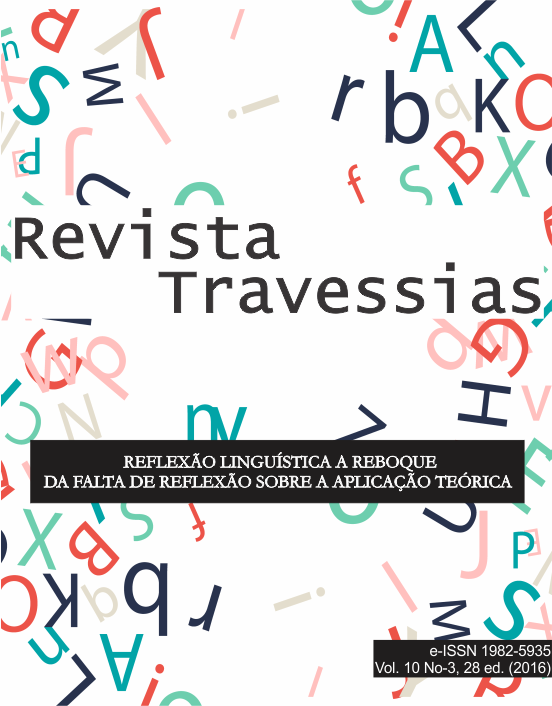Perspectivas metodológicas da utilização do cinema na Educação Superior
Palavras-chave:
Educação Superior, cinema, metodologia de ensino.Resumo
Este estudo parte da perspectiva de que o cinema atua como um elemento de aprimoramento cultural e intelectual dos discentes na Educação Superior. A investigação foi realizada na Universidade do Estado de Mato Grosso (Unemat), Campus Universitário do Vale do Teles Pires (Colíder/MT), no curso de Licenciatura em Computação, vinculada ao Grupo de Estudos sobre Universidade (GEU/Unemat). Inicialmente, utilizou-se de pesquisa bibliográfica, na sequência pesquisa documental e de campo por meio de questionário com acadêmicos do curso de Licenciatura em Computação. A partir destes dados, fez-se uma análise quali/quantitativa do uso do cinema enquanto perspectiva metodológica na Educação Superior. Também foi realizada uma análise para verificar se os temas dos filmes se relacionaram com as disciplinas. Para tanto, se recorreu aos planos de ensino do curso em questão para identificar se os docentes faziam menção ao uso do cinema, enquanto perspectiva metodológica. Verificou-se que essa abordagem é muito utilizada pelos docentes, embora muitas vezes, não a informam em seus planos. Apurou-se ainda, um número significativo de filmes assistidos pelos acadêmicos ao longo de sua formação. Desta forma, conclui-se com esta investigação que o cinema é capaz de transformar rotinas educacionais em metodologias dinâmicas. Infere-se que, como perspectiva metodológica, pode ser importante ferramenta na busca de um processo de ensino aprendizagem mais significativo.
Downloads
Referências
ALMEIDA, Maria Elizabeth Bianconcini; MORAN, Jose Manuel. Integração das tecnologias na educação. Brasília: Ministério da Educação (MEC), 2005.
BARDIN, Laurence. Análise de conteúdo. Lisboa: Edições 70, 2009.
DUARTE, Rosália. Cinema e educação. Belo Horizonte: Autêntica, 2009.
FABRIS, Elí Henn. Cinema e educação: um caminho metodológico. Educação e realidade. Porto Alegre, v.33, n. 1, p. 117-134, jan./jun. 2008.
FREIRE, Paulo. Professora sim, tia não. São Paulo: Olho d’Água, 1997.
JARA, Oscar. O que é metodologia. s/d, s/l, mimeo.
LIBÂNEO, José Carlos. Didática. São Paulo: Cortez, 1994.
LIMA, Michelle Pinto. As mulheres na ciência da computação. Estudos feministas v. 21, n. 3, 2013.
MARCONI, Marina de Andrade; LAKATOS, Eva Maria. Metodologia científica. 4. ed. São Paulo: Atlas, 2004.
MASCARELLO, Fernando. A historia do cinema mundial. Campinas: Papirus, 2006
MODRO, Nielson Ribeiro. Cineducação 2: usando o cinema na sala de aula. Joinville: UNIVILLE, 2006.
MORAN, Jose Manuel; MASETTO, Marcos Tarciso; BEHRENS, Marilda Aparecida. Novas tecnologias e mediação pedagógica. São Paulo: Papirus. 2000.
NAPOLITANO, Marcos. Como usar o cinema na sala de aula. São Paulo: Contexto, 2003.
NEZ, Egeslaine. Da sala de aula ao cinema universitário: um relato da interface ensino, pesquisa e extensão. Seminário Educação 2014 SEMIEDU: relações raciais e educação: dez anos de estudos e pesquisas na UFMT. Cuiabá: UFMT, 2014 (CD-rom).
______.; CONSONE, Cibele de Freitas. Experiências educativas com o cinema no ensino fundamental. Educa. Porto Velho, v. 2, n. 3, pp. 20-37, 2015.
PRESTES, Maria Luci de Mesquita. A pesquisa e a construção do conhecimento científico: do planejamento aos textos da escola à academia. 2 ed. São Paulo: Rêspel, 2003.
SANTOS FILHO, José Camilo.; GAMBOA, Silvio Sanches. (org.). Pesquisa educacional: quantidade-qualidade. 7. ed. São Paulo: Cortez, 2009.
UNEMAT, Campus Universitário Vale do Teles Pires. Histórico. Disponível em: Acessado em: 29 mar. 2015.
ZATTAR, Neuza Benedita. Do IESC à Unemat: uma história plural 1978-2008. Cáceres: Unemat, 2008.
Downloads
Publicado
Como Citar
Edição
Seção
Licença
Aviso de Direito Autoral Creative Commons
Política para Periódicos de Acesso Livre
Autores que publicam nesta revista concordam com os seguintes termos:
1. Autores mantêm os direitos autorais e concedem à revista o direito de primeira publicação, com o trabalho simultaneamente licenciado sob a Licença Creative Commons Attribution que permite o compartilhamento do trabalho com reconhecimento da autoria e publicação inicial nesta revista.
2. Autores têm autorização para assumir contratos adicionais separadamente, para distribuição não-exclusiva da versão do trabalho publicada nesta revista (ex.: publicar em repositório institucional ou como capítulo de livro), com reconhecimento de autoria e publicação inicial nesta revista.
3. Autores têm permissão e são estimulados a publicar e distribuir seu trabalho online (ex.: em repositórios institucionais ou na sua página pessoal) a qualquer ponto antes ou durante o processo editorial, já que isso pode gerar alterações produtivas, bem como aumentar o impacto e a citação do trabalho publicado (Veja O Efeito do Acesso Livre).
Licença Creative Commons
Esta obra está licenciada com uma Licença Creative Commons Atribuição-NãoComercial-CompartilhaIgual 4.0 Internacional, o que permite compartilhar, copiar, distribuir, exibir, reproduzir, a totalidade ou partes desde que não tenha objetivo comercial e sejam citados os autores e a fonte.



